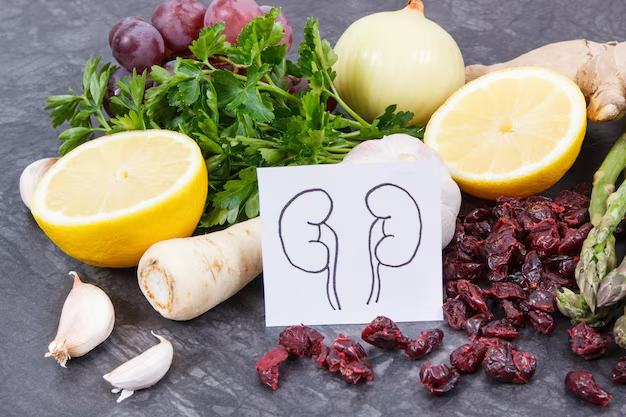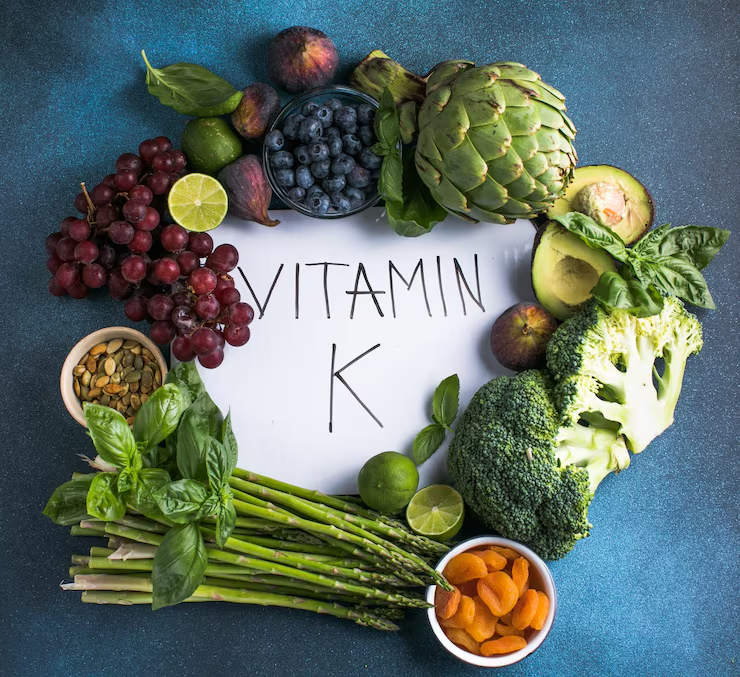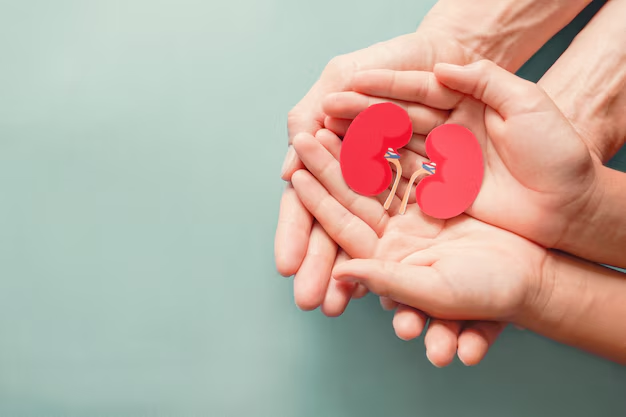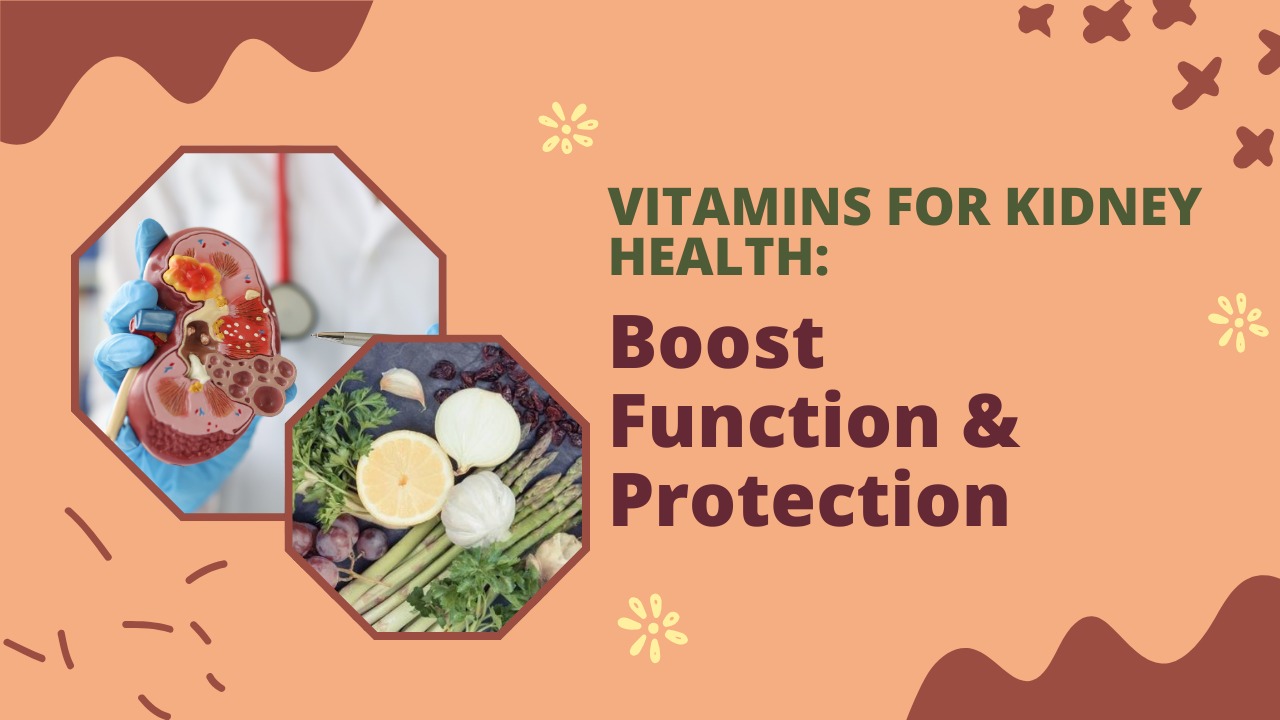Vitamins for kidney health play a vital role in supporting and preserving kidney function, especially as the global incidence of chronic kidney disease (CKD) continues to rise. While lifestyle habits like staying hydrated, eating a low-sodium diet, exercising, and avoiding overuse of painkillers are essential, targeted nutrition is equally important for long-term kidney wellness.
In addition to these lifestyle habits, getting the right vitamins for kidney health is crucial. Nutrients such as B-complex vitamins, vitamin D, C, E, and K support various kidney functions, from reducing inflammation to aiding in detoxification and calcium balance. Ensuring proper vitamin intake—through diet or supplements when necessary—can help keep your kidneys functioning optimally.
Adding the right vitamins for kidney health can further support optimal kidney function. Key vitamins like B6, B12, C, D, and E help reduce inflammation, support energy production, and aid in metabolic processes. However, it’s crucial to consult with a healthcare provider before starting any supplements, especially if you have pre-existing kidney conditions or are on medication.

One of the most overlooked yet effective ways to support kidney health is through vitamins. These powerful nutrients play a crucial role in promoting renal function, reducing inflammation, and supporting overall wellness.
The top tips involving vitamins for kidney health
Detailed functions of essential vitamins
Natural food sources and supplements
What to avoid for optimal kidney function
Safety and dosage considerations
Why Are Vitamins Important for Kidney Health ?
Vitamins play a crucial role in supporting various functions of the body, including kidney health. The kidneys help activate certain vitamins, such as vitamin D, which is essential for calcium absorption and bone strength. When kidney function declines, the body may struggle to maintain proper vitamin and mineral balance, affecting overall health.
Maintaining the right levels of vitamins for kidney health can help protect kidney cells, reduce inflammation, and support the body’s ability to process waste. For example, B vitamins support energy metabolism and red blood cell production, while vitamin C offers antioxidant protection. However, not all vitamins are safe in high doses for those with kidney issues.
Because the kidneys filter excess nutrients, too much of certain vitamins can build up in the body and cause harm. That’s why it’s important to choose the right vitamins for kidney health under the guidance of a healthcare provider, especially for individuals with existing kidney concerns.
Vitamins help regulate countless metabolic processes in the body. In the case of your kidneys, they:
- Support detoxification
- Reduce oxidative stress and inflammation
- Promote blood vessel health
- Help manage blood pressure
- Balance electrolyte and fluid levels
When your kidneys aren’t functioning well, they may not be able to filter waste effectively or regulate vitamin absorption. That’s why it’s essential to know which vitamins help or harm kidney health.
Top Vitamin Tips for Kidney Health
Embrace Vitamin B Complex for Energy and Renal Repair
Vitamins for kidney health, especially the B Complex group, play a key role in maintaining energy levels and supporting kidney repair. This group includes B1 (thiamine), B2 (riboflavin), B6, B12, folic acid, and more—all of which contribute to cell metabolism and red blood cell production. Since the kidneys are involved in filtering waste and producing hormones, adequate levels of B vitamins are essential for their optimal function.
For those with chronic kidney disease or at risk of it, B vitamins can help reduce fatigue and support nerve function, which is often affected in advanced stages of kidney problems. Additionally, certain B vitamins, like B6 and folate, help lower homocysteine levels, an ingredient that can damage blood vessels, including those in the kidneys.
Including B complex as part of your daily routine, under medical supervision, ensures you’re supporting your body’s natural repair processes. Among the most recommended vitamins for kidney health, B vitamins stand out for their regenerative and energizing properties.
Key B Vitamins: B1 (Thiamine), B2 (Riboflavin), B6 (Pyridoxine), B9 (Folate), B12 (Cobalamin)
Why It Matters: The B-complex group supports red blood cell formation, boosts energy metabolism, and helps reduce homocysteine levels (ingredients that can damage blood vessels and affect kidney function).
- B6 helps reduce kidney stone formation.
- B12 supports nerve function and prevents anemia (a common issue in CKD).
- Folate (B9) works with B12 to produce red blood cells and DNA.
Best Sources:
- Eggs
- Leafy greens
- Legumes
- Fish
- Whole grains
Supplement Tip: CKD patients often require a kidney-safe B-complex under medical supervision, especially if on dialysis.
Get Enough Vitamin D to Support Bone and Kidney Health

Vitamin D is essential not just for strong bones, but also for maintaining healthy kidney function. The kidneys play a major role in converting inactive vitamin D into its active form, which the body needs to absorb calcium and regulate bone metabolism. When kidney function declines, this conversion becomes impaired, increasing the risk of bone disorders.
Low levels of vitamin D are common in people with chronic kidney disease (CKD) and can lead to complications like bone pain, fractures, and muscle weakness. Ensuring adequate vitamin D levels helps reduce these risks and may also support immune function and lower inflammation, both important for kidney health.
Among the most important vitamins for kidney health, vitamin D stands out for its dual benefits on skeletal strength and renal support. However, because excess vitamin D can be harmful—especially for those with reduced kidney function—it’s important to monitor levels with your healthcare provider before taking supplements.
Why It Matters: Vitamin D helps regulate calcium and phosphorus levels, which are crucial for strong bones and healthy kidneys. It also reduces inflammation and may slow CKD progression.
Deficiency Risks:
- CKD patients often have low vitamin D because the kidneys activate it into its usable form (calcitriol).
- Deficiency leads to secondary hyperparathyroidism and bone disorders.
Best Sources:
- Sunlight (15–20 min daily)
- Fatty fish (salmon, mackerel)
- Fortified foods (milk, cereals)
- Supplements (vitamin D3 is preferred)
Supplement Tip: Always monitor vitamin D levels through blood tests. Excessive intake can lead to calcium buildup and damage the kidneys.
Incorporate Vitamin C — But Cautiously
Vitamin C is well-known for its immune-boosting and antioxidant properties, making it an important nutrient for overall health and one of the essential vitamins for kidney health. As an antioxidant, it helps reduce oxidative stress, which can damage kidney cells over time. This protective benefit is especially valuable for people at risk of chronic kidney disease or those aiming to maintain healthy kidney function.
When talking about vitamins for kidney health, it’s important to note that Vitamin C should be taken with care. In large doses, it can break down into oxalates, which may build up in the kidneys and lead to kidney stones or worsen existing kidney issues. This is a particular risk for individuals with reduced kidney function, as their bodies may have trouble removing oxalates effectively.
Despite these risks, vitamin C remains one of the beneficial vitamins for kidney health when taken in appropriate amounts. A balanced diet rich in natural sources like berries and bell peppers is a safer option than high-dose supplements. Always consult your doctor first.
Why It Matters: Vitamin C is a powerful antioxidant that helps reduce inflammation, boost immune function, and protect tissues from oxidative stress.
However, excess vitamin C can convert into oxalate, an ingredient that may form kidney stones, especially in people with kidney issues.
Safe Sources:
- Berries
- Bell peppers
- Broccoli
- Kiwi
- Citrus fruits (in moderation)
Dosage Tip: Stick to the RDA (65–90 mg/day) unless advised otherwise. Avoid high-dose supplements (>500 mg/day) without medical supervision if you have kidney disease.
Don’t Overlook Vitamin E — A Kidney-Protective Antioxidant
Vitamin E is a powerful antioxidant that plays a vital role in vitamins for kidney health by protecting cells from oxidative damage, including those in the kidneys. This nutrient supports immune function, reduces inflammation, and may help slow the progression of kidney-related conditions. By neutralizing harmful free radicals, Vitamin E contributes to the preservation of kidney tissues and overall organ function, making it an important component in maintaining long-term renal wellness.
Research suggests that oxidative stress plays a significant role in the development of chronic kidney disease (CKD), making antioxidants like Vitamin E an important part of vitamins for kidney health. This nutrient not only helps prevent and manage oxidative damage but may also improve blood vessel function. Healthy circulation is essential for kidney health, as the kidneys depend on efficient blood flow to filter waste and maintain fluid balance effectively.
As one of the important vitamins for kidney health, vitamin E should not be overlooked. However, like other fat-soluble vitamins, it can accumulate in the body if taken in excessive amounts. High doses may interfere with blood clotting or medications, so it’s best to get vitamin E from food sources like nuts, seeds, and green leafy vegetables, or use supplements only under medical supervision.
Why It Matters: Vitamin E is an antioxidant that combats oxidative stress, which is a major factor in CKD progression and dialysis complications.
Studies suggest that vitamin E may:
- Reduce kidney inflammation
- Protect against diabetic nephropathy
- Support cardiovascular health in CKD patients
Best Sources:
- Almonds
- Sunflower seeds
- Spinach
- Avocado
- Olive oil
Supplement Tip: Vitamin E supplements (200–400 IU/day) may benefit some CKD patients but must be prescribed to avoid excess accumulation, especially in dialysis patients.
Prioritize Vitamin K for Vascular and Bone Health

Vitamin K plays a vital role in both bone and vascular health, which are closely connected to kidney function and are an essential part of vitamins for kidney health. This nutrient helps regulate calcium use in the body, ensuring it is directed into the bones rather than deposited in the arteries. For individuals with kidney issues, maintaining proper calcium balance is crucial, as imbalances can cause vascular calcification and weaken bones, ultimately affecting overall kidney health.
In individuals with chronic kidney disease (CKD), vitamin K deficiency is common and highlights the importance of vitamins for kidney health. Low levels of vitamin K can increase the risk of cardiovascular problems and bone fractures, both of which are serious concerns for kidney patients. Supporting proper vitamin K intake may help reduce these risks by improving calcium metabolism, protecting blood vessels, and maintaining overall bone integrity, which in turn supports better kidney health.
As one of the essential vitamins for kidney health, vitamin K should be prioritized in a kidney-friendly diet. Leafy greens like kale and spinach are rich in vitamin K, but those with advanced CKD should consult a healthcare provider before increasing intake, especially if they are on blood thinners, as vitamin K can interact with certain medications.
Why It Matters: Vitamin K plays a role in calcium metabolism, helping prevent vascular calcification — a serious issue in kidney disease.
It also supports:
- Bone mineralization
- Cardiovascular protection
- Reduction in arterial stiffness
Best Sources:
- Kale
- Broccoli
- Brussels sprouts
- Green beans
Supplement Tip: Vitamin K2 (menaquinone) is particularly beneficial. If you’re on blood thinners like warfarin, consult your doctor before altering vitamin K intake.
Watch Out for Fat-Soluble Vitamins A and D in CKD
Fat-soluble vitamins, such as vitamins A and D, are essential for many bodily functions and are important vitamins for kidney health, but they require special attention in individuals with chronic kidney disease (CKD). Unlike water-soluble vitamins, these nutrients are stored in the body’s fat tissues and liver, which means they can accumulate to harmful levels when kidney function is impaired. Careful monitoring and proper dosage are crucial to ensure these vitamins for kidney health provide benefits without causing toxicity.
In CKD, the kidneys’ ability to regulate and excrete excess vitamin A and convert vitamin D into its active form is reduced. This can lead to toxicity if supplements are taken without medical supervision. Vitamin A toxicity may cause symptoms like nausea, dizziness, and even damage to organs, including the kidneys themselves.
While both vitamins are important vitamins for kidney health, individuals with CKD must monitor their intake carefully. Regular blood tests and guidance from a healthcare provider are essential to ensure safe levels. Never self-prescribe fat-soluble vitamins if you have impaired kidney function or are at risk.
Why It Matters: While vitamins A and D are essential, over-supplementation can harm the kidneys, especially when they’re already compromised.
Vitamin A Risks:
- Hypervitaminosis A can lead to toxicity, causing nausea, dizziness, and worsening kidney function.
Better Approach:
- Meet vitamin A needs through food (carrots, sweet potatoes, spinach) rather than supplements unless prescribed.
- Avoid multivitamins with high vitamin A doses.
Use Antioxidant-Rich Nutrients for Kidney Detox
Antioxidant-rich nutrients play a key role in supporting kidney detoxification by neutralizing harmful free radicals and reducing oxidative stress. Since the kidneys are constantly working to filter toxins from the blood, they are particularly vulnerable to damage caused by these unstable molecules. Antioxidants help protect kidney cells and support their ability to function effectively.
Vitamins such as C and E, along with minerals like selenium and zinc, are among the most powerful antioxidant nutrients. They not only assist in reducing inflammation but also enhance the kidneys’ ability to detox naturally. Including colorful fruits, vegetables, nuts, and seeds in your diet can boost your intake of these protective nutrients.
As important vitamins for kidney health, antioxidants should be part of a well-balanced diet aimed at preserving renal function. However, supplementation should be approached with caution, especially for those with chronic kidney disease. Always consult a healthcare professional before starting any antioxidant regimen. Besides classic vitamins, certain antioxidant co-factors help kidneys detox more efficiently.
Helpful Nutrients:
- Alpha-lipoic acid
- CoQ10
- N-acetyl cysteine (NAC)
Best Sources:
- Meats
- Organ meats (in moderation)
- Spinach
- Tomatoes
- Broccoli
Supplement Tip: These nutrients can be part of a kidney-support formula, especially for diabetic or hypertensive patients, under professional guidance.
Balance Electrolytes with Vitamin Support

Balancing electrolytes is crucial for healthy kidney function, as the kidneys regulate levels of sodium, potassium, calcium, and magnesium in the body. When kidney function declines, this balance can be disrupted, leading to complications like muscle cramps, heart issues, or fatigue. Supporting electrolyte balance with the right nutrients is essential for overall well-being.
Certain vitamins play a role in maintaining this balance. For example, vitamin D helps regulate calcium and phosphate levels, while B vitamins support nerve function and hydration balance. These vitamins for kidney health help ensure that electrolyte levels remain stable, especially in individuals managing chronic kidney disease (CKD).
A diet rich in kidney-friendly foods like leafy greens, whole grains, and lean proteins can provide these vital nutrients naturally. However, those with CKD or electrolyte imbalances must be cautious, as excess intake—especially through supplements—can worsen symptoms. Always consult a healthcare provider before making significant dietary or supplement changes.
Vitamins indirectly regulate electrolytes like sodium, potassium, calcium, and phosphorus, which are crucial for kidney function.
Imbalances Can Lead To:
- Hypertension
- Edema
- Heart arrhythmias
- Bone demineralization
How to Support Balance:
- Use vitamins B, D, and K to assist in electrolyte and mineral balance
- Eat kidney-friendly foods (low sodium, potassium-modified as needed)
- Monitor levels with regular lab work
Avoid: Over-the-counter sports drinks or supplements high in potassium or phosphorus unless prescribed.
Vitamins to Avoid or Limit with Kidney Problems
Certain vitamins or supplements can do more harm than good if you have kidney issues.
| Vitamin/Supplement | Risk for Kidney Health |
| Vitamin A | Toxic at high levels |
| High-dose Vitamin C | Oxalate kidney stones |
| Magnesium (Excess) | Can build up in CKD |
| Creatine | May stress kidneys |
| Herbal diuretics | May dehydrate and strain kidneys |
Always consult your nephrologist or renal dietitian before starting any new vitamin or supplement.
Dosage and Safety Considerations
| Vitamin | Safe Daily Range (General Adult) | Notes |
| B-complex | 100–300% RDA | Often safe in CKD |
| Vitamin C | 65–90 mg | Limit to 200 mg in CKD |
| Vitamin D | 600–2000 IU | Test levels before supplementing |
| Vitamin E | 200–400 IU | Avoid excess |
| Vitamin K | 90–120 mcg | Caution with blood thinners |
| Vitamin A | 700–900 mcg | Avoid supplement form in CKD |
Natural Food Sources vs Supplements
When it comes to getting vitamins for kidney health, both natural food sources and supplements have their place. Whole foods provide a balanced mix of nutrients along with fiber, antioxidants, and phytonutrients that work together to support overall health, including kidney function. Leafy greens, fruits, nuts, seeds, and whole grains are excellent natural sources of essential vitamins.
However, for individuals with chronic kidney disease (CKD) or restricted diets, it can be difficult to get enough nutrients from food alone. In these cases, carefully chosen supplements may help fill nutritional gaps. For example, B vitamins and vitamin D are often recommended for those with kidney issues due to poor absorption or impaired conversion by the kidneys.
While supplements can be helpful, they should never replace a healthy diet and must be used with caution. Some vitamins, especially fat-soluble ones, can build up in the body and cause harm. Always seek medical advice before supplementing.
Best Kidney-Supporting Foods

- Blueberries
- Cauliflower
- Garlic
- Apples
- Egg whites
- Red bell peppers
- Cabbage
Supplements are useful when:
- You’re on dialysis
- Have absorption issues
- Have dietary restrictions
Pro tip: Choose kidney-specific multivitamins labeled for renal support.
Conclusion
Maintaining healthy kidneys is essential for overall well-being, as these organs play a critical role in filtering waste, balancing fluids, and supporting vital functions like blood pressure and red blood cell production. A balanced lifestyle—including proper hydration, a nutritious diet, and regular exercise—lays the foundation for kidney health. One often overlooked aspect is the role of essential vitamins for kidney health, which help protect and support kidney function.
Certain vitamins such as B-complex, D, C, E, and K provide antioxidant protection, aid in cellular repair, regulate calcium metabolism, and help manage inflammation. For those with chronic kidney disease (CKD) or restricted diets, getting the right amount of these nutrients is crucial. However, not all vitamins are safe in excess, and some may build up to harmful levels when kidney function is compromised.
Including kidney-friendly foods rich in essential nutrients is the safest approach, but supplements may be necessary for some individuals. Before starting any supplement regimen, especially for vitamins for kidney health, it’s important to consult a healthcare provider. With the right balance, you can support your kidneys and improve your overall health.
FAQs
Q1. What are the best vitamins for kidney health ?
The most beneficial vitamins for kidney health include B vitamins (especially B6, B12, and folate), vitamin D, vitamin C (in moderation), vitamin E, and vitamin K. These support energy production, reduce inflammation, and promote bone, blood, and vascular health.
Q2. Can people with chronic kidney disease take vitamin supplements ?
Yes, but with caution. People with CKD often have different nutrient needs and may not process certain vitamins well. Supplements should only be taken under medical supervision to avoid toxicity or harmful interactions.
Q3. Is it better to get vitamins from food or supplements ?
Natural food sources are usually preferred because they provide a balance of nutrients. However, individuals with kidney issues may need supplements to correct deficiencies or manage symptoms.
Q4. Can too many vitamins harm the kidneys ?
Yes. Excessive intake of fat-soluble vitamins (like A and D) can accumulate and damage kidneys, especially in those with reduced kidney function.
Q5. Are multivitamins safe for kidney patients ?
Not all multivitamins are safe. Some contain minerals like potassium or phosphorus, which may be harmful in CKD. Always choose kidney-specific supplements and consult your healthcare provider.


